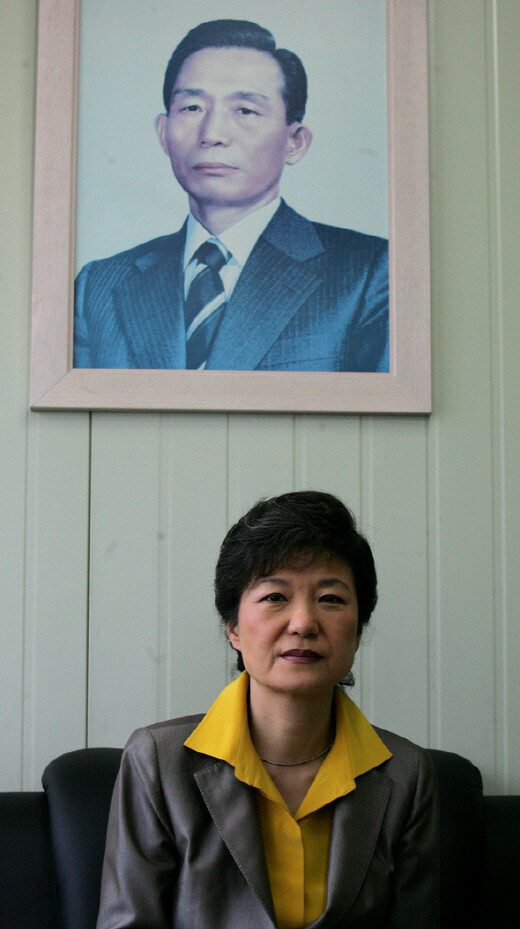hankyoreh
Links to other country sites 다른 나라 사이트 링크
Park Geun-hye to traverse father’s legacy

By Seong Yeon-cheol
She is a prominent figure whose father’s legacy has simultaneously bequeathed both an inheritance and debt. He bequeathed upon her the political capital to allow her to enjoy the highest support rating in the land, but also left her the soil in which rivals and critics would call her “daughter of a dictator” and “the Yusin Princess.” Presidential candidate Park Geun-hye’s fate will be decided by how she handles both her father’s inheritance and his debts.
“Leadership. A folksy appearance. Nostalgia for Park Chung-hee...” They are the leading legacies left behind by her father. Former ruling Grand National Party Chairwoman Park earned her way into the National Assembly in 1998 by winning a commanding 61 percent support in the Daegu Dalseong by-election. Without the aura of her father behind her, it would have been difficult for her to have so easily beat Eum Sam-tak, who had been nominated by an alliance of the then-ruling National Congress for New Politics and United Liberal Democrats. In the various press evaluations of former presidents, the late President Park Chung-hee always places first.
Myongji University Professor Kim Hyeong-jun said of Park Geun-hye’s support, “10 to 15 percent should be seen as a halo effect from her father.”
The existence of a strong veto base against Park and an image of returning to the past are the debts from her father’s legacy. The repression of human rights during the Yusin era produced a “Park Geun-hye veto base” just as strong as the base that has nostalgia for Park‘s rule. Special Affairs Minister Lee Jae-oh’s criticism of Park Geun-hye as a “dictator‘s daughter” and “Yusin Princess” during a GNP lawmaker study session in Gurye, South Jeolla Province in 2004 shows the sentiment of this absolute veto base.
During a verification hearing as a GNP presidential candidate in 2007, Park said her father’s May 16, 1961 coup was a “revolution to save the nation.” At the time, even those within the Park faction complained that it was an overstatement.
“It is a stretch to connect the Park Geun-hye of today and the merits and demerits of Park Chung-hee in the past,” said one Park faction lawmaker from Busan. “The very view connecting the present with what happened 50 years ago is an attempt to slander the former GNP chairwoman.”
It is clear, however, that regardless of the judgment of the Park faction, whether it is in the primaries or the final election, Park‘s opponents’ major attack point will be the issue of her father.
“The fact that people who suffered or were victimized during the Yusin era remain as a strong veto force can only be a heavy liability for Park,” said Professor Kim. “She must clearly express how the values at which she aims differ from the values at which her father aimed.”
On Aug. 12, 2004, while she was head of the Grand National Party, Park apologized to late President Kim Dae-jung, telling him that as Park Chung-hee’s daughter, she apologized for Kim suffering several losses and undergoing hardship under her father. This was during a closed-door meeting at Kim’s home in Seoul‘s Donggyo neighborhood. At the time, the possibility was raised of her apologizing to the people for the mistakes of her father’s “Yusin Dictatorship,” but after this, no apology was made to victims or the public.
“How serious Park Geun-hye consider the issue of human rights abuses under her father will become an important standard by which to judge her,” said Professor Shin Yul of Myongji University. “There is a big difference Park viewing the victims of human rights abuses with a human sorrow and her interpreting the abuses as a problem with the power structure of the time.”
Please direct questions or comments to [englishhani@hani.co.kr]
Editorial・opinion
![[Guest essay] Preventing Korean Peninsula from becoming front line of new cold war [Guest essay] Preventing Korean Peninsula from becoming front line of new cold war](https://flexible.img.hani.co.kr/flexible/normal/500/300/imgdb/original/2024/0507/7217150679227807.jpg) [Guest essay] Preventing Korean Peninsula from becoming front line of new cold war
[Guest essay] Preventing Korean Peninsula from becoming front line of new cold war![[Column] The state is back — but is it in business? [Column] The state is back — but is it in business?](https://flexible.img.hani.co.kr/flexible/normal/500/300/imgdb/original/2024/0506/8217149564092725.jpg) [Column] The state is back — but is it in business?
[Column] The state is back — but is it in business?- [Column] Life on our Trisolaris
- [Editorial] Penalties for airing allegations against Korea’s first lady endanger free press
- [Editorial] Yoon must halt procurement of SM-3 interceptor missiles
- [Guest essay] Maybe Korea’s rapid population decline is an opportunity, not a crisis
- [Column] Can Yoon steer diplomacy with Russia, China back on track?
- [Column] Season 2 of special prosecutor probe may be coming to Korea soon
- [Column] Park Geun-hye déjà vu in Yoon Suk-yeol
- [Editorial] New weight of N. Korea’s nuclear threats makes dialogue all the more urgent
Most viewed articles
- 1Behind-the-times gender change regulations leave trans Koreans in the lurch
- 2South Korean ambassador attends Putin’s inauguration as US and others boycott
- 3Family that exposed military cover-up of loved one’s death reflect on Marine’s death
- 4Yoon’s broken-compass diplomacy is steering Korea into serving US, Japanese interests
- 5[Guest essay] Preventing Korean Peninsula from becoming front line of new cold war
- 6Marines who survived flood that killed colleague urge president to OK special counsel probe
- 7Japan says its directives were aimed at increasing Line’s security, not pushing Naver buyout
- 8Yoon’s revival of civil affairs senior secretary criticized as shield against judicial scrutiny
- 9Amid US-China clash, Korea must remember its failures in the 19th century, advises scholar
- 10Lee Jung-jae of “Squid Game” named on A100 list of most influential Asian Pacific leaders